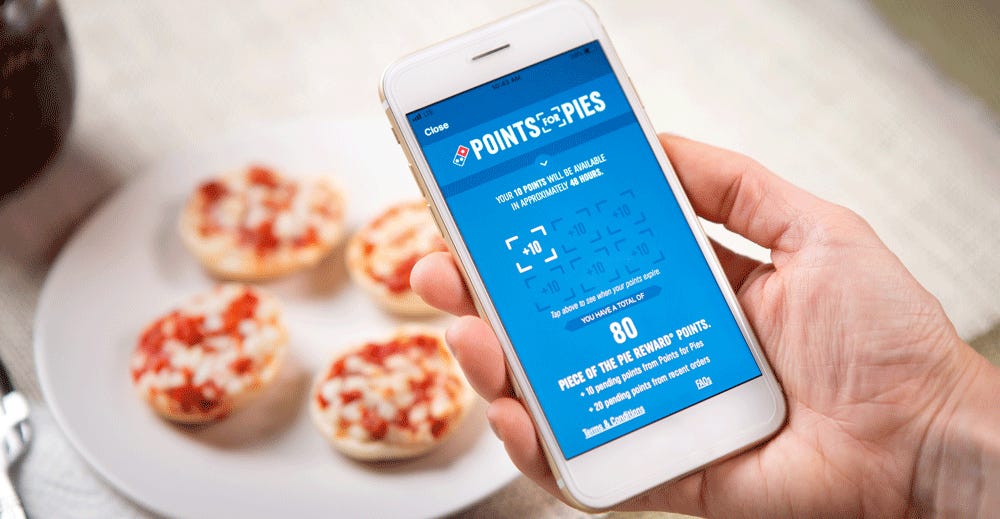Software is the new content marketing
Why companies should stop competing with creators and start building products
When Domino’s sponsored the Super Bowl in 2019, they oriented their whole campaign around a product called “Points for Pies.” The app allows you to scan a pizza (any pizza, not just Domino’s) to earn 10 points. Collect 80 points and get a free pie from Domino’s. And of course, you also get a lifetime of promotions from Domino’s via the mobile app you’ve now downloaded onto your phone.
Building Points for Pies in 2019 likely cost Domino’s millions of dollars. But what happens when products like that can be built for a few thousand bucks? We’re starting to find out. Since we launched Robo, I’ve been surprised by how many of our clients are founders of existing companies looking to build products to supplement or replace their existing marketing spend.
The opportunity is obvious once you see it. Instead of fighting a losing battle against influencers to produce viral media, companies can increasingly market via what they do best — building products.
Just look at ChatGPT. What began as OpenAI's product demo became the most effective marketing campaign of 2022, reaching 100 million users faster than any product in history. As AI makes software cheaper and traditional content marketing less effective, software will be the new form of marketing for forward-thinking companies.
Companies aren’t influencers
Traditional content marketing has been dying for a while, but AI is going to rip the plug out. For what it’s worth, I didn’t use AI to write this article (how old fashioned of me) but it’s already hard for you to trust me on that. Pretty soon it will be impossible to know.
It’s not just thought leadership type blog posts either — pretty much every channel companies use to drive leads via static content is going to get arbitraged to death. The impending efficacy free fall of cold outreach needs no explanation for anyone with an email inbox. Traditional PR is on the sinking ship of traditional media.
The result is that companies will continue migrating to social networks as their core focus. But that means competing with creators and influencers on platforms built for creators and influencers, which is … hard. Many companies are fighting the short-form content fight valiantly, adopting the Duolingo strategy of hiring interns to post unhinged content that makes board members age several years at each meeting.
Long term though, I expect companies to decide that waging war with creators on even footing is not very smart. The unfair game they can play is pretty obvious, because it’s what companies are built to do — create products.
Expanding the pie
Domino’s “Points for Pies” campaign itself wasn’t anything new — big brands have built marketing apps for years. IKEA launched “IKEA place,” an AR app to help you design your home, in 2017. Snickers created an app with Spotify to suggest a playlist based on a user-uploaded “hungry face” as part of their famous “You’re not you when you’re hungry” campaign.
But what's interesting isn't that these apps exist — it's how much the cost of building them has changed. Points for Pies clearly cost millions to build. There's a whole TechCrunch article about how Domino’s used Nvidia chips to train a neural network to detect pizzas from non-pizzas, and even got users involved in the labeling. Amusingly, the article is actually sponsored by Nvidia. Hard to imagine them paying for that basic level of awareness just a few years ago.
Building an app like that today, just a few years later, could cost 100X less via the right team. The computer vision in that app would be a 1 penny API call instead of a TechCrunch-worthy engineering project, and the rest of the experience could be whipped up pretty quickly using modern AI-enabled tools.
Let me put it this way — if someone came to me asking how much it would cost for us to build that product for them at Robo, I’d probably estimate it at $5-10k. Obviously building at Domino’s scale and security would add some cost, but even that is an increasingly solved problem.
The world hasn’t recalibrated to that reality, but it’s here.
As Don Draper famously said, “success comes from standing out, not fitting in” and modern companies will increasingly use software to stand out. Especially because traditional content marketing is dying fast.
- Joey
P.S. We’ll have some case studies launching soon but in the meantime if you want examples of the kinds of marketing products we are working with companies to build, just reach out and I’m happy to share.


